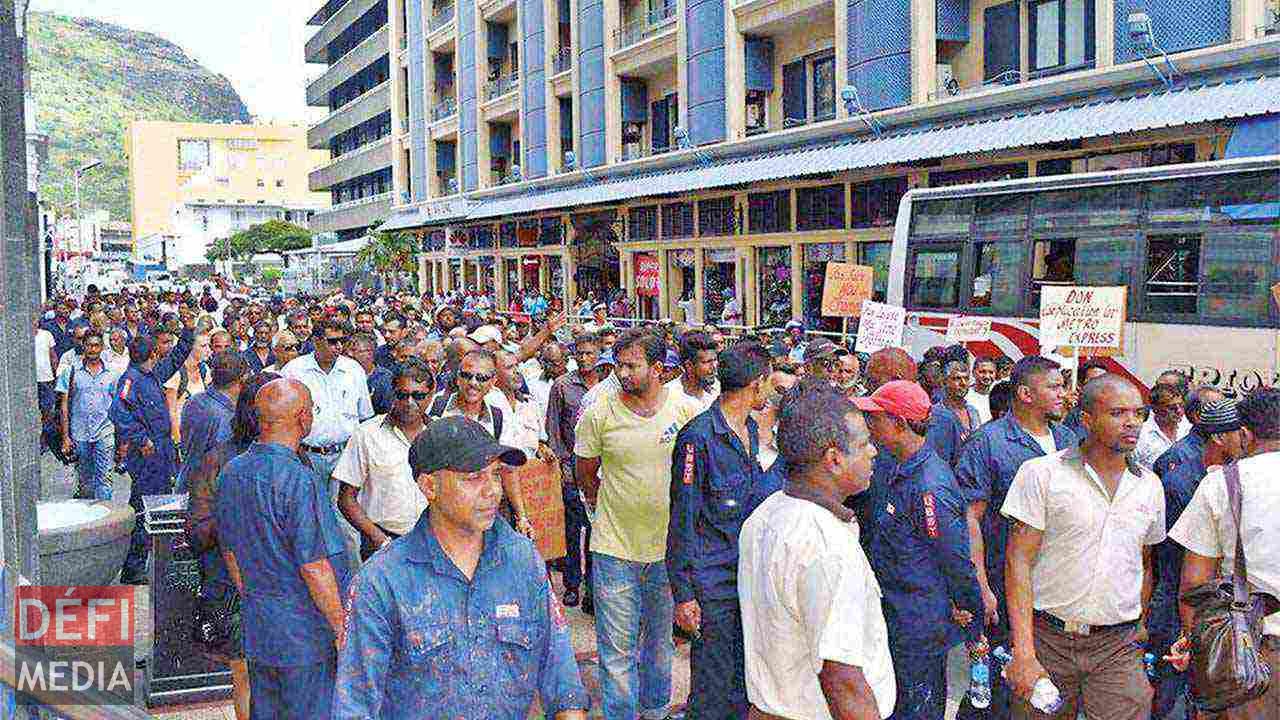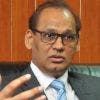
Labour Day will be celebrated next Monday. It will be an occasion for workers to ponder over their future, given the current economic situation. In this paper, we highlight the main concerns of workers and the challenges they are currently facing.
Publicité
Labour Day will be celebrated this year in a particular context. The past few weeks have witnessed many street protests of workers on different issues. First of all, the advent of the new light rail project is being resented by many workers in the transport sector as they fear mass redundancies. Despite the reassurance by the transport minister Nancoomar Bodha, that there will be no job loss, workers remain sceptical, especially those of the United Bus Service, whose main operations are in the ‘metro express’ catchment area. We have also recently seen primary school cleaners, mostly women, protesting against their low pay, which, they claim range between Rs 1,500 to Rs 2,000. Another controversy arose on the high salaries and benefits and other entitlements paid to government advisers. Social media network is rife with comments on these issues. Amidst all these, the National Wage Consultation Council is busy at work to determine the minimum salary payable to workers across all economic sectors. The minimum salary is an electoral promise in the ruling alliance’s electoral manifesto. While there is a strong will to introduce the minimum salary, its determination in a complex economy like ours is not an easy task.
Figures:
Official figures indicate that, at the end of the year 2016, the unemployment rate was estimated at 6.6%. The number of unemployed persons was estimated to be 38,900. This consists of 13,200 men and 25,700 women. Around 18,300 unemployed persons were under the age of 25. The active population at work is estimated at 546,600 persons.
Metro Express scares workers
The Metro Express is one of the most costly projects ever undertaken in Mauritius. It will create new jobs and opportunities for businesses. However, the Association of Public Transport Workers is not convinced and has been protesting against this project. The workers fear they may become redundant if the Metro Express takes over a number of bus routes. According to a Common Front regrouping workers’ unions and social workers, the transport sector employs more than 6 000 persons and they are highly concerned about their future. Employees of the United Bus Service are more anxious as the routes operated by this company are in direct competition with the Metro Express. The government on its side has stated that there will be no job losses but workers remain sceptical.
Cleaners protest
While debates on the minimum salary are ongoing, women cleaners working in primary school are protesting against their low salary, ranging between Rs 1,500 and Rs 2,000. They are demanding an urgent pay review. The ‘Confédération des Travailleurs du Secteur Privé’ is supporting these women.
Minimum salary: The debate is on
The ‘National Wage Consultative Council (NWCC)’, introduced in 2016, and chaired by Beejaye Kumar Appanah, former Director of the Pay Research Bureau (PRB), is working on the minimum salary. The average salary in Mauritius is said to be Rs 12,800 but Statistics Mauritius has not yet come up with an official figure. On the other hand, the poverty line is said to be at Rs 10,895. Trade Unions believe that there is enormous inequality between the highest and the lowest salaries and also disparities between salaries in the public and the private sector. It is also estimated that as many as 100,000 workers in Mauritius earn less than Rs 6,000 per month, and this trend is predominant in the manufacturing (mainly textile) sector, as well as the sea food sector. The ‘National Wage Consultative Council (NWCC)’ will determine the minimum salary payable to workers by early 2018.

Advisers’ perks
This is another hot debate these days. Following revelations in Parliament about the salaries of perks of top government advisers and other CEOs, politicians, the salaries paid to government advisers have bene the talk of the town among politicians, trade unions and civil society. While those concerned argue that competence and intelligence has a price and it is the performance and outcome that matter, critics reply that political appointees cannot cumulate several functions as this might have a negative incidence on performance.
Youth unemployment
Statistics show that unemployment affects more and more youngsters. Many young graduates are still struggling to find a job. Various programs such as Youth Employment Programme (YEP) or the National Skills Development Programme (NSDP) have as objectives to reduce youth unemployment. But the issue is that these programmes offer temporary solace to graduates, who, once their traineeship is over, have to face the reality of the job market.
 Arvind Nilmadhub: « Non-monetary benefits to workers »
Arvind Nilmadhub: « Non-monetary benefits to workers »
Talking on the minimum salary, economist Arvind Nilmadhub explains that in Mauritius, workers also benefit from many non-monetary advantages. “For example, in Mauritius cooking gas is heavily subsidised by the government, as well as rice and flour. Schoolchildren benefit from free bus transportation. Thus, an average typical family may easily be saving as much as Rs 2,000 per month. This is an indirect compensation for low income families. However, a minimum salary is vital for the economy, not only to combat poverty, but to further stimulate the economy through increased household expenditure. This multiplier effect will be beneficial to everyone. But there are also other issues arising, namely whether small enterprises will be able to pay a higher salary. If they can’t, then there will be layoffs and we don’t want a higher salary to cause redundancies.” Arvind Nilmadhub adds that he has no issue with high salaries paid to top advisers or CEOs as long as they deliver and their performance adds value to the economy. “If these officials increase efficiency which in turn cuts down costs, then this is welcome. If their ideas help create more jobs, then their pay is justified. Performance is not measured by number of hours worked Sometimes a small idea by an intelligent and highly competent person can bring about a big positive change in society.”
History
Labour Day was celebrated for the first time in Mauritius in 1938, two years after the creation of the Labour party by Dr Maurice Curé and his companions Jean Prosper, Mamode Assenjee, Dr. Hassenjee Jeetoo, Barthelemy Ohsan, Samuel Barbé, Emmanuel Anquetil, Godefroy Moutia, and Pandit Sahadeo. More than 35,000 workers had sacrificed a day’s wage and came from all over the island to attend a giant meeting at the Champ de Mars in Port Louis. The following year, Dr Maurice Curé, while addressing the gathering, proposed that Labour Day should be a public holiday. However, it is Guy Rozemont, another stalwart of the Labour party who is closely associated with the granting of public holiday for labour Day. Rozemont himself was inspired by Emmanuel Anquetil. Labour Day became a public holiday on 1st May 1950. In Mauritius, Labour Day is also an occasion for political parties to organize public rallies and display their force.
Foreign workers
There are nearly 30,000 foreign workers in Mauritius, under a Work Permit, engaged mainly in the manufacturing, textile, construction and seafood sectors. There are also about 5,000 Occupation Permit holders. While the law is very strict regarding health and safety and good working conditions of foreign labour, there are few cases where foreign workers work in deplorable conditions in Mauritius. Most often, the workers do not complain for fear of being reprimanded.
Worker issues
Safety at work remains an important issue. Only last week, there was an incident where a worker died on a boat that caught fire. Accidents at work are a common occurrence and often these mishaps reveal the absence of proper risk assessment. Many workers have lost their lives in road accidents involving motorcycles. Many small tradesmen, entrepreneurs and self-employed persons have no notion of risk assessment and safety precautions and many lives are lost and many get injured due to negligence. Transport is also an issue as many workers travel by private ‘contract’ vans that do not respect basic road rules. It is also often seen on our roads how trucks carry foreign workers in cramped conditions, with no regards to their safety in case of accidents. In jobs that involve heavy lifting, often workers are not adequately trained in moving and handling heavy goods, resulting in injuries or disorders.

Notre service WhatsApp. Vous êtes témoins d`un événement d`actualité ou d`une scène insolite? Envoyez-nous vos photos ou vidéos sur le 5 259 82 00 !
























